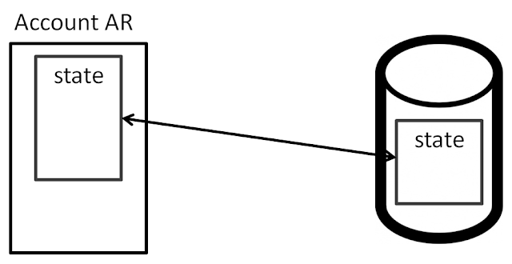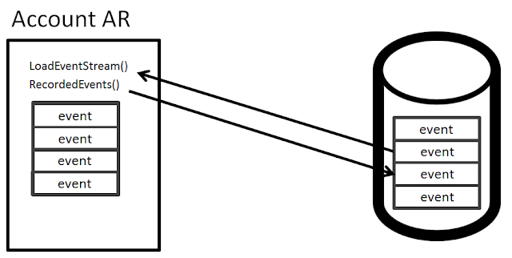An event sourced aggregate
Last week I shared my theoretical understanding of event sourcing. Today, I want to make an attempt at making that theory tangible by implementing an event sourced aggregate.
In traditional systems, we only persist the current state of an object.
In event sourced systems, we don’t persist the current state of an object, but the sequence of events that caused the object to be in the current state.
If we want an aggregate to be event sourced, it should be able to rebuild itself from a stream of events, and it should be able to record all the events it raises.
public interface IEventSourcedAggregate : IAggregate
{
void Initialize(EventStream eventStream);
EventStream RecordedEvents();
}
Let’s implement the example aggregate we used last week: an account. An account owner can deposit and withdraw an amount from his account. There is a maximum amount policy for withdrawals though.
public class Account : IEventSourcedAggregate {
private readonly Guid _id;
public Account(Guid id) {
_id = id;
}
public Guid Id { get { return _id; } }
public void Initialize(EventStream eventStream) {
throw new NotImplementedException();
}
public EventStream RecordedEvents() {
throw new NotImplementedException();
}
public void Deposit(Amount amount) { }
public void Withdraw(Amount amount) { }
}
Next to the Initialize and RecordedEvents method, our aggregate facade hasn’t changed. We still have a Deposit and a Withdraw operation like we would have in a traditional aggregate. How those two methods get implemented differs though.
When we deposit or withdraw an amount, we want to - instead of changing the state directly - apply events. When an event gets applied its handler will first be invoked, for the event then to be recorded.
public void Deposit(Amount amount) {
Apply(new AmountDeposited(amount));
}
public void Withdraw(Amount amount) {
if (amount.IsOver(AmountPolicy.Maximum)) {
Apply(new WithdrawalAmountExceeded(amount));
return;
}
Apply(new AmountWithdrawn(amount));
}
private void Apply(IEvent @event) {
When((dynamic)@event);
_eventRecorder.Record(@event);
}
An event recorder is a small object that keeps track of recorded events.
public class EventRecorder
{
private readonly List<IEvent> _events = new List<IEvent>();
public void Record(IEvent @event) {
_events.Add(@event);
}
public EventStream RecordedEvents() {
return new EventStream(_events);
}
}
This object will be used to have our aggregate return a stream of recorded events.
public EventStream RecordedEvents() {
return _eventRecorder.RecordedEvents();
}
We can now also implement initializing the aggregate from a stream of events.
public void Initialize(EventStream eventStream) {
foreach (var @event in eventStream)
When((dynamic)@event);
}
Here too, event handlers are invoked by using the dynamic run-time to find the best overload.
It’s the event handlers that will change the aggregate’s state. In this example, they can be implemented like this.
private void When(AmountWithdrawn @event) {
_amount = _amount.Substract(@event.Amount);
}
private void When(AmountDeposited @event) {
_amount = _amount.Add(@event.Amount);
}
private void When(WithdrawalAmountExceeded @event) { }
A test verifies that when I invoke operations on the aggregate, all the events are recorded, and the state has changed. When I use those recorded events to rebuild the same aggregate, we end up with the same state.
[TestMethod]
public void ICanReplayTheEventsAndHaveTheStateRebuilt() {
var account = new Account(Guid.NewGuid());
account.Deposit(new Amount(2500));
account.Withdraw(new Amount(100));
account.Withdraw(new Amount(200));
Assert.AreEqual(3, account.RecordedEvents().Count());
Assert.AreEqual(new Amount(2200), account.Amount);
var events = account.RecordedEvents();
var secondAccount = new Account(Guid.NewGuid());
secondAccount.Initialize(events);
Assert.AreEqual(new Amount(2200), secondAccount.Amount);
Assert.AreEqual(0, secondAccount.RecordedEvents().Count());
}
And this is all there is to an event sourced aggregate.
For this exercise I tried to keep the number of concepts low. Many will have noticed that extracting a few concepts would benefit re-use and explicitness.
Also using the DLR to invoke the correct event handlers might be frowned upon; it’s not the most performant method, each event must have a handler, and in case a handler is missing the exception is not pretty. Experienced readers will also have noticed concepts such as versioning and snapshots are not implemented yet. I hope limiting the amount of concepts and indirections made this blog post easier to read.
Next week: where do I persist these events?

